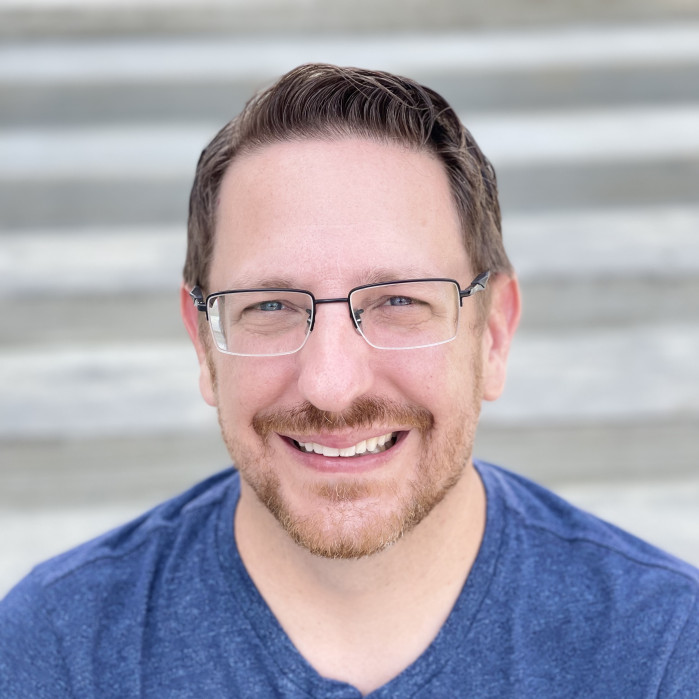When Amanda Davidson, a 42-year-old Los Angeles-based artist and writer, welcomed her firstborn child in December — a boy named Felix — with her partner Isaac Schankler, 39, a composer, she chafed at the assumptions the medical staff members made about how the pair wanted to identify themselves as parents.
“‘Hi, Mommy! Where’s Daddy? Mommy needs to know this, but so does Daddy,’” she said with a big laugh. The binary clashed so much with how the couple sees themselves and exists in the world — she’s queer-identified, and her partner goes by pronouns they/their/them and uses the gender-neutral title Mx. — she refrained from calling herself anything vis-à-vis Felix for the first two weeks of his life.
She eventually settled on Mama. “I was racking my brain for a mama-alternate, but it feels right for the moment,” she said, adding that in her universe, “identity wiggles around,” and she’s open to other possibilities.
Mx. Schankler remembers reading the queer writer Andrea Lawlor’s essay on identifying as “Baba” (as opposed to some iteration of mother) in Mutha magazine and thinking that “dad” or “daddy” wouldn’t work for them either, so they opted for “Abba.” It means “dad” in Hebrew, providing a link to their Jewish heritage: “It does feel more gender-neutral, or at least doesn’t have quite the same baggage that dad and daddy have,” Mx. Schankler said.
Naming is particularly important to the pair as a means of signaling their queerness, since they “pass” as a straight couple. “We don’t look visibly queer,” Ms. Davidson said, “So in some ways, our choice of names helps us affirm our identities.”
The duo’s ambivalence about traditional monikers is reflected in a study, currently under peer review, on the naming practices in same-sex adoptive families. The study, by Abbie E. Goldberg, Clark University’s pioneering L.G.B.T. family scholar; Melissa Manley, a doctoral student, and Emma Frank, a recent Clark graduate, is one of the few on the topic. It found that of 80 participants — 20 lesbian couples and 20 gay couples — recruited from adoption agencies across the United States, including cities with high concentrations of lesbian and gay populations, all opted for derivatives of mother and father.
And nearly 13 percent — 20 percent of the lesbian couples and 5 percent of the gay couples — participated in some version of “undoing gender.” Many do this by taking parental names from their native cultures or religions that strip away the binary in this cultural context, collapsing the dichotomy between terms by merging them, such as “Mather,” a fusion of mother and father, or creating nicknames (“Muzzie,” in one instance).
Ellen Kahn, the director of the Children, Youth & Families Program at the Human Rights Campaign, said the gender binary that underlies “mother” and “father” doesn’t jibe with some parents’ self-understanding and self-presentation: “For queer parents who don’t think of themselves as gender conforming, ‘mommy’ and ‘daddy’ may be a little discordant with the way they think about themselves.”
Both Dr. Goldberg and Ms. Kahn surmise that the couples who are using new terminologies are willing to do so because of the hard-won rights L.G.B.T. people have secured, particularly the right to marry. “Now there’s more willingness to push some of those boundaries,” Dr. Goldberg said, “because of greater legal recognition and acceptance.”
Also, Ms. Kahn said, some L.G.B.T. people don’t want to seem as if they are aping heterosexuals: “There’s a political component for some, which is that we don’t want to seem like we’re emulating or mimicking straight people.” Similarly, there’s a contingent of L.G.B.T. people who refuse marriage because they don’t want to be “assimilated into this heterosexual, patriarchal society,” Dr. Goldberg added. (Others feel the institution reinforces an unfair hierarchy that privileges matrimonial coupledom above all other forms of romantic coupling.)
Dr. David Schwartz, a psychoanalyst and psychologist who has spent his decades-long career thinking about the ways in which gender and sexuality get constructed, however, isn’t so sure eschewing traditional parental labels is good for L.G.B.T. parents or their kids. While he’s all for challenging the gender norms that inform the mommy and daddy dyad, he pointed out that children of L.G.B.T. parents are already steeped in a heteronormative culture that stigmatizes their families, and it would be doubly hard for them to have to explain why they call their parents some unusual names. “And,” he emphasized, “you certainly don’t want to do anything to devalue your family,” noting that the legitimacy, visibility and value of L.G.B.T. people as parental figures is often called into question already.
“I won’t say it’s a disadvantage,” Dr. Goldberg said, “but it’s a challenge. It requires a lot of explanation and clarification, maybe even pushback from schools in certain geographical contexts, less gay-affirming areas of the country, like, ‘What do you mean you go by ‘Maddie’?” — an amalgamation of mommy and daddy. “Nobody is going to know what that means. How do we explain that to other children?’”
For families who decide to adopt atypical terms and want to minimize the potential risk of social discomfort, Dr. Goldberg suggested some parents might consider giving children the freedom to call them mom or dad “in certain settings and at certain ages,” adding, “they may become more comfortable with alternative language as they grow older.”
Ms. Kahn guessed that the reason the vast majority of participants in Dr. Goldberg’s study stuck with labels derived from mother or father is because becoming a parent was beyond the community’s reach for so long. “It’s so powerful to be a parent,” she said, “to have the title mom or dad. A lot of us want that because for decades it seemed like it wasn’t on the table for us to build a family, so there’s almost like a privilege in finally being able to say ‘I’m a mom’ or ‘I’m a dad.’”
Eric Rosswood, author of “The Ultimate Guide for Gay Dads” and “Journey to Same-Sex Parenthood,” said we shouldn’t get too hung up on parenting terms as a means of upending the status quo: “We’re already defying labels and challenging gender stereotypes regardless of what we call ourselves.”
Dr. Goldberg agreed: “The label is not the role. Being a parent is being a parent,” she said. “It’s actually quite interesting that we don’t have a de-gendered parenting label in English, but in the 21st century our roles are far less gendered.”
For Ms. Davidson — and 26 percent of the participants (14 lesbians and seven gay men) in Dr. Goldberg’s study who believe that their parenting labels could change over time — “naming is fluid and subject to infinite riffing.” She cataloged a list of her many nicknames, which play off her first name, Amanda: Manzo, Manzers, Man and Sissy Man, among others. “I’m sure we’ll riff, invent and gather up new words,” Ms. Davidson said, “Felix will surely contribute some of his own. I’m open to what lies beyond ‘Mama’ … I just don’t know what it is yet.”
An earlier version of this article misstated the percentage of parents in a study who were “undoing gender” by creating new names. It is nearly 13 percent, not a quarter.


